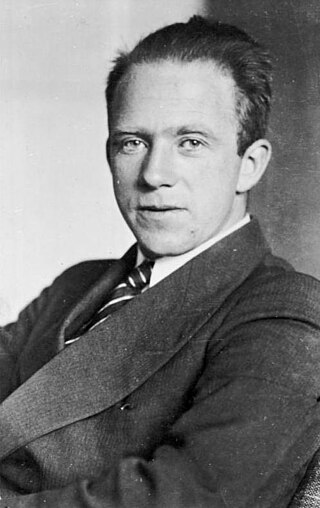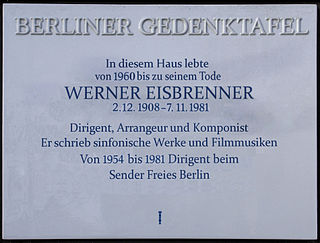Related Research Articles

Werner Karl Heisenberg was a German theoretical physicist and one of the main pioneers of the theory of quantum mechanics. He published his work in 1925 in a major breakthrough paper. In the subsequent series of papers with Max Born and Pascual Jordan, during the same year, his matrix formulation of quantum mechanics was substantially elaborated. He is known for the uncertainty principle, which he published in 1927. Heisenberg was awarded the 1932 Nobel Prize in Physics "for the creation of quantum mechanics".

The Olympiastadion is a sports stadium at Olympiapark Berlin in Berlin, Germany. It was originally built by Werner March for the 1936 Summer Olympics. During the Olympics, the record attendance was thought to be over 100,000. Today the stadium is part of the Olympiapark Berlin.

Werner Julius March was a German architect, son of Otto March (1845–1913), and brother of Walter March, both also well-known German architects. Werner March designed Germany's 1936 Olympic stadium. Werner March was born in Charlottenburg and died in Berlin.

The 2nd U-boat Flotilla, also known as the Saltzwedel Flotilla, was the second operational U-boat unit in Nazi Germany's Kriegsmarine. Founded on 1 September 1936 under the command of Fregattenkapitän Werner Scheer, it was named in honour of Oberleutnant zur See Reinhold Saltzwedel. Saltzwedel, a U-boat commander during World War I, died on 2 December 1917, when his submarine UB-81 was sunk by a mine in the English Channel.

Switzerland competed at the 1936 Summer Olympics in Berlin, Germany. 190 competitors, 184 men and 6 women, took part in 100 events in 21 sports.

Germany was the host nation and top medal recipient at the 1936 Summer Olympics in Berlin. 433 competitors, 389 men and 44 women, took part in 143 events in 22 sports.

Werner Janssen was an American composer and conductor of classical music and film scores. He was the first New York-born conductor to lead the New York Philharmonic. For his film work he was nominated for six Academy Awards.

Theodore B. Werner was a U.S. Democratic politician who served as a member of Congress from South Dakota.

Werner Friedrich Emil Eisbrenner was a German composer and conductor, best known for his film music.

Karl Adolf Kurt Werner Klingler was a German film director and actor. He directed 29 films between 1936 and 1968. He was born in Stuttgart and died in Berlin, Germany.
Rudolf Vilim was a Swiss canoeist who competed in the 1936 Summer Olympics.
Werner Zimmermann was a Swiss slalom and sprint canoeist who competed from the mid-1930s to the mid-1950s. As a slalom canoeist, he won three medals at the ICF Canoe Slalom World Championships with a gold and two bronzes. As a sprint canoeist, he competed in two Summer Olympics. At the 1936 Summer Olympics, he finished sixth in the K-2 10000 m event. Twelve years later, he finished 11th in the K-2 10000 m event.
Events from the year 1936 in Denmark.

The 9th Infantry Division was a formation of Nazi Germany's Wehrmacht.
Werner Plath was a German swimmer who competed in the 1936 Summer Olympics. He was born in Berlin. He was executed during World War II.
Werner Hochbaum was a German screenwriter, film producer and director.
Werner Scharf was a German actor. He appeared in more than 45 films between 1929 and 1945.
Werner Bruno Wilhelm Hermann Stock was a German actor. He appeared in more than 130 films and television shows between 1932 and 1971.
The German foreign office had a sizable network of diplomatic missions when Nazis came to power in 1933. While it was a deeply traditional and elitist organisation within the German civil service, it enthusiastically helped the Nazis prosecute an ambitious foreign policy.